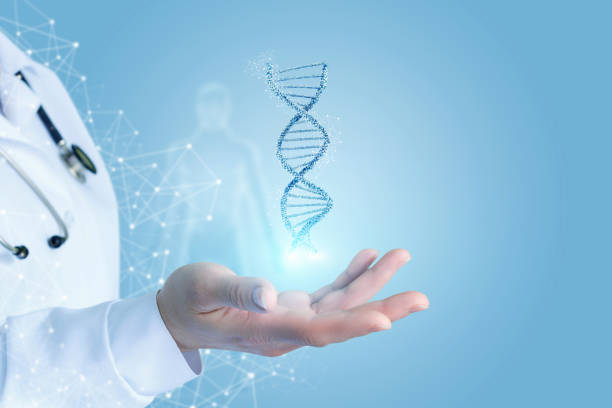Congratulations on taking the first step towards becoming the hero of your own health story! You're not just choosing to eat better by exploring the powerful world of nutrigenomics. You're choosing to wield the incredible power of your diet to communicate with your DNA. It's like stepping into a control room, where every healthy food choice pushes a lever or turns a dial to boost your body's health and vitality.
And we all want more control over things in our lives, right?
You're not at the mercy of your genetic blueprint anymore. Instead, you're in the driver's seat, ready to steer your health in the direction you want. Welcome to the beginning of your most empowered, health-forward adventure by learning five ways to change your genetic destiny with nutrigenomics!
But First of All, What Is Nutrigenomics?
Nutrigenomics is a cutting-edge field of science that explores the crossroads where nutrition, genetics, and health meet. It can revolutionize food and how you think about its impact on your body. Nutrigenomics looks at how the food you consume can affect your genes. It also explores how any genetic variations you may have can influence your dietary needs and health outcomes.
Understanding your genetic makeup allows you to use nutrigenomics to develop a unique diet to support your health. This personalized approach to nutrition deviates from one-size-fits-all dietary recommendations—you don't fit into a mold. Instead, nutrigenomics focuses on how you, as an individual, can adapt your diet according to your genetics.
For example, you and your mom's side of the family may be genetically prone to problems with blood sugar or weight. By using nutrigenomics when you eat, you can choose foods that support healthy blood sugar levels and weight. These foods include those low in sugar and unhealthy fats.(1)
Nutrigenomics can empower you with the knowledge to make informed decisions about your diet. It helps you move beyond generic dietary guidelines to what's best for you as an individual. This approach supports your overall health so you can fight disease with all your might.
How Can I Find Out About My Genetics?

Learning about your genetic health can be an exciting and enlightening journey. It can help you live a healthier lifestyle tailored to your unique DNA.
There are several steps you can start taking today to learn more about your genetics:
- Ask Your Family: Talking to your family about health issues can give you a sneak peek into your genetic blueprint. It's like putting together a puzzle. Each piece is a story from your relatives, showing patterns of health conditions that run in your family. Knowing your family’s health history helps you and your doctor understand what to watch out for. It's a simple step, but it sets up a game plan for keeping you healthier.
- Buy an At-Home DNA Kit: One of the simplest ways to start is by undergoing genetic testing through a reputable company specializing in nutrigenomics. You'll need to provide a saliva sample, and a kit will be sent to your home. Once your sample is analyzed, you'll receive a report detailing various genetic markers. You'll learn what they mean for your health, diet, and even your exercise regime.
- Talk with your healthcare practitioner: Talking with your healthcare provider can help you understand your genetics and how they impact your health. They can tell you how your genetic makeup may increase your risk for certain diseases. Knowing this information can help them recommend ways to manage these risks. Your healthcare practitioner will also talk about your results in a way that makes sense. With this knowledge and your health history, they can help you make informed decisions about your diet, lifestyle, and preventive care strategies. You'll feel empowered to take charge of your health in a personalized way.
- Visit a Genetic Counselor: Engaging with a genetic counselor who understands nutrigenomics can offer deeper insights into your test results. They can also help interpret the data, including how your genes might influence your response to different foods, nutrients, and lifestyle choices. A counselor can also provide personalized advice, helping you make informed decisions about your diet and health management strategy.
- Learn as much as you can: By learning more about nutrigenomics, you can determine which foods might make you feel awesome and which might make you feel awful. Nutrigenomics is more than just something to help you stay fit. It's about making choices that help your body work its best based on what's written in your DNA. Reading a book like Dirty Genes can also help you understand how your body interacts with the food you eat—and why it may misbehave.
What Are Some Ways That My Genes Can Change Through Nutrigenomics?

While nutrition cannot change your DNA, you can support healthy gene expression by using nutrigenomics to develop healthy habits. For example, eating nutritious foods supports genetic health so your body can defend itself against disease.(2) By choosing specific foods over others and incorporating healthy practices into daily life, you can tell your genes to act in ways that support good health. You'll also be helping yourself feel at your optimal best now and for years to come.
Some examples of how nutrigenomics supports healthy gene expression include:
- Eating more fish and nuts, including Omega-3 fatty acids. Healthy fats support heart health and healthy inflammatory responses.
- Choosing whole grains over refined to support healthy blood sugar levels so they don't spike. Having consistently healthy blood sugar levels can help you maintain your energy level.
- Getting active to support how well you process fats and sugar. Exercising can help keep you fit inside and out.
- Cutting down on sugary drinks and drinking plenty of water to help your genes fight off cravings. Swapping soda for water helps support healthy weight and metabolism.
- Snacking on berries and greens is good for your health. They contain antioxidant properties, like vitamins A, B, C, and E. These antioxidant properties support healthy cell function.
- Getting enough sleep every night supports your genes, so your body is better at fighting off germs and staying healthy. We all can use a little help getting better sleep, so take the time to learn and practice good sleep habits.
It helps to think of your body as a high-performance vehicle. Just like premium fuel can make a car run smoother and more efficiently, premium foods can do the same for your body. By choosing foods that communicate positively with your genetic blueprint, you can support your body's ability to fight disease, repair damage, and function at its best.
What Are 5 Ways to Change My Genetic Destiny with Nutrigenomics?
Understanding the power of nutrigenomics can empower you to make food choices that support your health at a molecular level. Here are five potent ways you can begin changing your genetic destiny today:
1. Understand Your Genetic Makeup

As you read earlier, understanding your genetic makeup is crucial in nutrigenomics. This knowledge helps you support your health through personalized nutrition. Your DNA is unique. It contains the biological instructions that make you who you are, including how your body processes certain foods.
For instance, you may have a methylenetetrahydrofolate reductase (MTHFR) mutation, which affects how your body metabolizes folate and homocysteine. If you have the mutation, your body can’t convert folate to its usable form. If this is the case, there are foods you should avoid and those you should eat to support this condition. You'll also need to steer clear of foods and supplements fortified with folic acid, which your body can't process. Instead, you'll want to eat foods with natural folate, which your body can use right away. You can also take an MTHFR support supplement to get the necessary folate.†
In general, genetic profiling is critical to understanding the following:
- Your Health Risks: Genetic testing can show if you're prone to specific diseases. This knowledge helps you and your doctor create a plan to lower your risk.
- Potential Medication Reactions: Some people's genes affect how they respond to medicines. Genetic testing can show which medications might cause side effects. This information can help your doctor pick the best treatment for you when you're sick.
- Your Family's Unique Health Pattern: By comparing your genetic test results with your family history, you can spot health issues that run in your family. You can use this information to guide you on the lifestyle changes or screenings you need to stay healthy.
2. Optimize Nutrient Absorption

Optimizing nutrient absorption is central to nutrigenomics. It helps you maximize the potential of a healthy diet. We all absorb and metabolize nutrients differently, largely due to genetics. Understanding genetics enables you to change your diet to support your natural absorption capabilities.
Lifestyle and environmental factors also impact nutrient absorption. These factors include:
- Mood: When your mood is low, your body can't efficiently absorb vitamins and minerals from food. It's like trying to read a book with loud music playing—it's harder to focus. A balanced mood can help your body get more nutrients from your food.
- Sleep quality: Not getting enough sleep is like using your phone on low battery all day—it just doesn't work as well. Your body needs good sleep to help digest food and absorb nutrients properly. Ensuring you get enough rest helps your body get all the good stuff from your meals. And, if you’re able to absorb all the nutrients you need, you’re supporting good sleep quality.(3) It’s not a vicious circle—it’s a healthy one!
- Physical activity: Regular exercise is more than building muscle tone and losing weight. When you exercise, your body works better and can absorb nutrients from food more efficiently. Think of exercise as a way to support your body's ability to use the healthy food you eat.
- Irregular eating patterns: Your body works better when you have meals and snacks consistently throughout the day. This consistency helps your body predict and prepare for food intake, supporting nutrient absorption. Inconsistent or irregular eating patterns—like overeating at night or snacking too much throughout the day—can negatively impact your ability to absorb nutrients.(4)
- Hydration: Drinking enough water ensures your body and all the processes it needs to perform run smoothly. In the world of nutrigenomics, water helps transport nutrients to your cells and removes waste. Water itself is a nutrient! Think of it as helping your body's cells receive the "good stuff" from what you eat more effectively. When you exercise, it's also critical to drink plenty of water and consider a hydration supplement to replenish lost nutrients.†
3. Support Detoxification Processes

Nutrigenomics also helps you understand how certain foods can support the genes responsible for breaking down toxins and clearing them out of your system. Think of your body as a luxury car where some foods act like premium fuel. They enable the engine—your genes—to work better and more efficiently to eliminate waste products.
These foods include:
- Foods High in Antioxidant Properties: Berries, nuts, and green leafy vegetables contain antioxidant properties, including the alphabet of vitamins. These foods may also contain glutathione, which acts as an antioxidant that supports cell health. Foods with antioxidant properties help your body eliminate toxins.(5) Think of them as the body's cleanup crew, sweeping away the bad stuff that can make you sick.
- Cruciferous Vegetables: Cruciferous vegetables like broccoli, cabbage, and kale are nutrient-dense and contain compounds that support liver detoxification.(6) Eating these colorful veggies is like giving your liver the tools to filter out toxins more effectively, which is critical for nutrigenomics.
- Foods Containing Omega-3 Fatty Acids: Fatty fish, flaxseeds, and walnuts are excellent sources of omega-3s. These fats support enzymes in detoxification, making it easier for your body to cleanse itself. Omega-3s also support healthy liver function so your body can break down and eliminate toxins.(7) You can also take a detoxification support supplement to support this process.†
This personalized approach helps you fine-tune your diet to optimize how well your body cleanses itself. Understanding your genes allows you to select the best foods to support detoxification. Getting rid of harmful toxins supports a healthier you.
4. Personalize Your Diet To Support a Healthy Weight

Nutrigenomics goes beyond the one-size-fits-all approach to dieting. It helps you personalize your eating plan for weight management based on your genetic blueprint.
Picture this: your friend eats carbs all day, every day, and doesn't gain an ounce, while you just glance at a doughnut and feel your jeans tighten.
Frustrating, right?
But here's where nutrigenomics comes into play. By understanding how genetics affects your body's response to food, you can tailor your diet to suit your metabolic needs. For example, if you have problems metabolizing fats, you might need a diet lower in fats and higher in complex carbohydrates. This information can help you create a diet designed for your genetic predisposition rather than following the latest diet trend.
You can personalize your diet for optimal weight management by doing the following:
- Finding out your genetic makeup: A genetic test can show you how your body processes different types of food. For example, some people might find it harder to lose weight because of how their body deals with carbs or fats. Knowing your genetic profile allows you to tailor your diet to what works best for you, like choosing more foods your body can use efficiently.
- Paying attention to how foods make you feel: Notice how your body reacts after you eat. Do certain foods make you feel tired or bloated? Nutrigenomics suggests this could be due to how your genes interact with these foods. Start keeping a food diary to track what you eat and how it affects you. This way, you can determine which foods help you feel energized and which make you want to nap.
- Experimenting with different foods and portions: Everyone's body is unique, so a diet that works for one person might not work for another. Experiment with various healthy foods and portion sizes to see what helps you maintain or lose weight. Remember, it's not just about eating less; it's about eating right for your genetic makeup.
5. Support Your Health To Fight Disease Through Diet

Nutrigenomics plays a critical role in supporting your health so you can fight disease. By understanding your genetics, you can change your eating habits to support good health, especially if your family has a history of health problems.
For example, suppose your genetic report shows a higher risk for heart problems. Eating foods high in omega-3 fatty acids and fiber can support a healthy heart. This approach also supports your body's defenses so you can stay as healthy as possible.
Eating according to your genetic makeup also supports healthy inflammatory responses, cholesterol levels, and blood pressure. These are all key to supporting overall good health.
Incorporating the following healthy diet habits can be a great place to start:
- Choosing heart-healthy foods. Foods with omega-3 fatty acids, like salmon, avocado, and nuts, support heart health.(8) These foods talk to your genes in a way that supports healthy inflammatory responses so your heart stays healthy.
- Loading up on fruits and vegetables. Eating colorful fruits and veggies can support immunity so you can fight disease.(9) These foods contain natural substances like antioxidant properties that support cell health. It's like giving your body a sword and shield in the battle against illness.
- Cutting down on processed foods. Foods high in sugar and bad fats can mess with your genes and lead to problems with blood sugar and weight.(10,11) Eating more whole foods and less junk food supports a healthy weight and well-being. It's about choosing foods that support your gene health as a step towards overall good health and well-being.
The Bottom Line

Nutrigenomics offers you powerful insight into how you can support your genetic blueprint to stay healthy. You're not just feeding your body by choosing the right foods and lifestyle habits. You're supporting the very essence of who you are—your genes. It may sound like something out of a sci-fi movie, but your daily choices, like eating more greens, opting for whole foods over processed snacks, getting enough exercise, and drinking plenty of water, can change your genetic destiny. Understanding nutrigenomics means you’ll have more control over your health than you might have once thought.
By making informed choices, you support good health and longevity.
It's not about becoming someone you're not. It's about supporting your well-being by understanding and working with your unique genetic makeup, not against it, so that you can live your best life!

References:
- https://diabetes.org/food-nutrition/food-blood-sugar
- https://pubmed.ncbi.nlm.nih.gov/34835928/
- https://pubmed.ncbi.nlm.nih.gov/27702409/
- https://pubmed.ncbi.nlm.nih.gov/30925707/
- https://pubmed.ncbi.nlm.nih.gov/22228951/
- https://pubmed.ncbi.nlm.nih.gov/26167297/
- https://pubmed.ncbi.nlm.nih.gov/37538264/
- https://medlineplus.gov/ency/patientinstructions/000767.htm
- https://pubmed.ncbi.nlm.nih.gov/34976746/
- https://pubmed.ncbi.nlm.nih.gov/31938015/
- https://medlineplus.gov/ency/patientinstructions/000838.htmSeek
† These statements have not been evaluated by the Food and Drug Administration (FDA). This product is not intended to diagnose, treat, cure, or prevent any disease.












